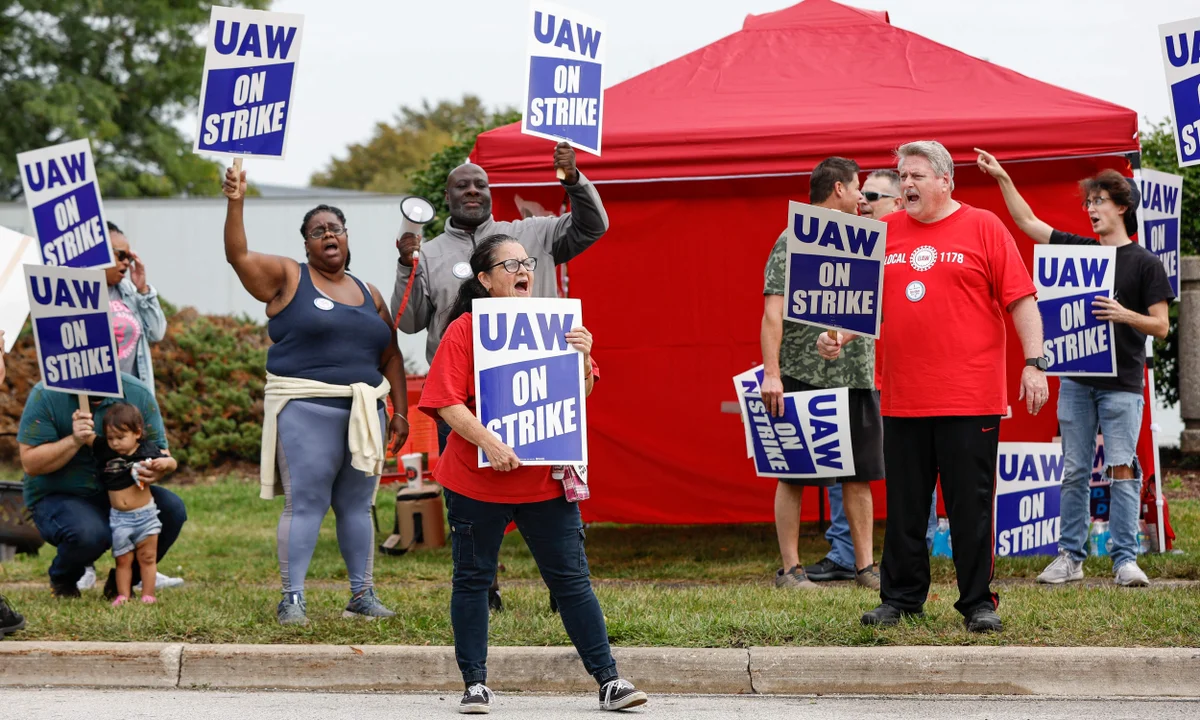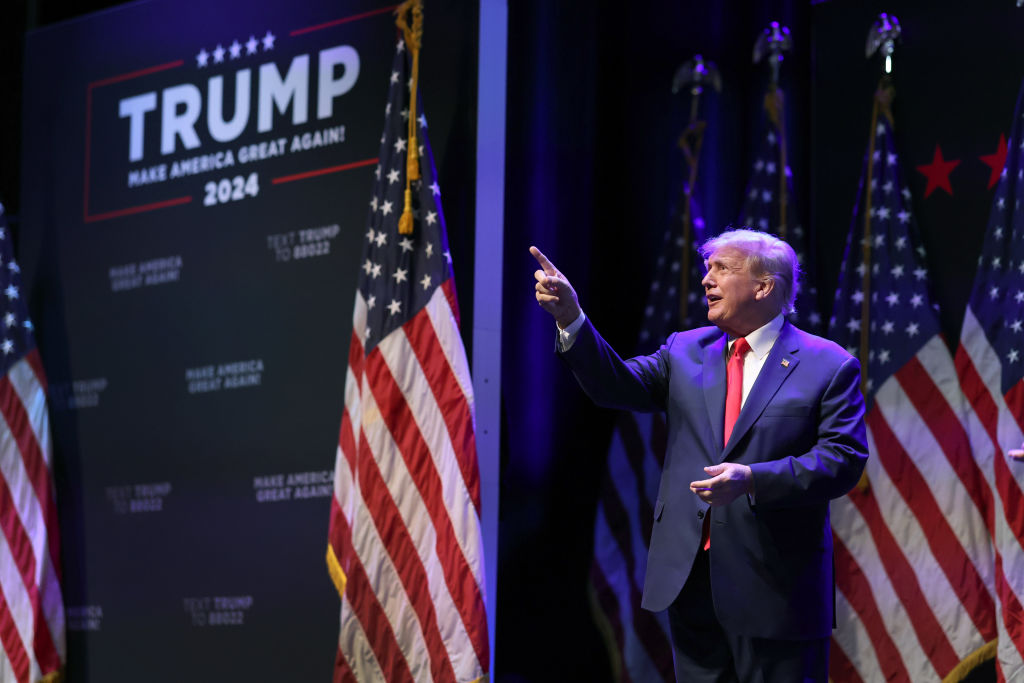Originally by at The Guardian U.S.
Donald Trump proclaimed he was for “all the forgotten men and women”, in his acceptance speech at the Republican convention. His vice-presidential pick JD Vance consistently portrays himself as a pro-worker populist. But an analysis of the labor chapter of Project 2025 – an ambitious rightwing plan to guide the next Republican presidency – found it has little to offer them.
Project 2025’s labor section proposes hardly anything to improve workers’ wages and working conditions. It is, however, chock full of recommendations that would boost corporate profits, undercut labor unions and advance the rightwing culture war.
Project 2025 contains several recommendations that would, when taken together, cut the pay of millions of workers, especially by making overtime pay available to fewer workers, even though many Americans rely on overtime pay to make ends meet. This so-called “Presidential Transition Project” shows outright hostility toward government employee unions – whether police unions, firefighters’ unions or teachers’ unions – saying that Congress should consider abolishing all public sector unions. Project 2025 would further undermine unions by recommending a ban on the use of card check, one of labor’s most effective tools to organize workers. Once a union gets a majority of employees at a workplace to sign pro-union cards, unions often point to this majority support to persuade employers to grant union recognition and bargain.
Project 2025 was undertaken by the Heritage Foundation and was written by numerous Trump allies, many of whom served in his administration and many of whom are likely to serve under him again if he wins in November, Trump has distanced himself from the project’s hard-right proposals, arguing, contradictorily, that he knows nothing about the project while adding that he disagrees with some of its proposals. Political analysts predict that if Trump is elected, his administration will pursue many of Project 2025’s policies.
Worker advocates have vigorously condemned Project 2025. Stuart Appelbaum, president of the Retail, Wholesale and Department Store Union, said: “For 900 pages, Trump’s Project 2025 playbook dives into excruciating detail on how a Trump-Vance administration will roll back workers’ rights, curbing the right to organize, eliminating overtime pay laws, gutting health and safety protections and protections against child labor.”
The 37-page labor chapter contains recommendation after recommendation designed to make corporations and rightwing ideologues happy. With many employers complaining that today’s low jobless rate makes it hard to find enough workers, Project 2025 recommends making it easier for 16- and 17-year-olds to work in dangerous jobs – jobs that federal law currently makes off-limits to workers under the age of 18.
“Some young adults show an interest in inherently dangerous jobs. Current rules forbid many young people … from working in such jobs. This results in worker shortages in dangerous fields and often discourages otherwise interested young workers from trying the more dangerous job,” Project 2025 says.
The project says the Department of Labor should amend its regulations to let teenagers “work in more dangerous occupations”, for instance, metal-stamping plants with heavy machinery. Project 2025’s authors seem far more concerned about assuring that more teens work in dangerous jobs than about protecting against the perils those jobs pose for young workers.
David Weil, who headed the labor department’s wage and hour administration under Barack Obama, criticized this recommendation, saying the nation had adopted child labor laws partly because of the huge power imbalance between employers and young workers. “We protect children from hazardous work as a statement of our values as a society and because the young people most likely to agree to hazardous work are the most vulnerable to that power imbalance,” Weil said.
Helping corporations cut labor costs
Project 2025 has several far-reaching proposals that would reduce corporations’ labor costs and boost their bottom lines. The project calls for repealing the 93-year-old Davis-Bacon Act, which requires contractors on public works projects to pay the prevailing wage paid to local workers doing similar work. Davis-Bacon was enacted to prevent government contractors from winning projects by underbidding competitors through ever-lower labor costs. The nation’s building trades unions vigorously oppose repealing Davis-Bacon because that would push down construction wages.
Project 2025 would shrink many workers’ paychecks by calling for a law that limits when they receive overtime pay – to only when they work more than 80 hours over a two-week period, instead of the current system of working more than 40 hours in one week. That means if an employee works 55 hours one week and 25 the next, that worker won’t qualify for overtime pay, despite working 55 hours one week.
In another proposal that would slice labor costs, Project 2025 says workers who qualify for overtime pay should be able to choose to receive compensatory time rather than time-and-a-half overtime pay. The project says this idea aims to give workers more time with their families, but many worker advocates say it is a ploy to enable employers to twist workers’ arms so that they take comp time instead of time-and-a-half pay.
Weil, the former wage and hour director, warned that employers might abuse this proposal: “Unfortunately, in too many work settings, workers would be pressured into taking the accumulated time option and then have trouble using that time when they chose to do so,” he said.
Project 2025 would also cut labor costs by proposing to make it easier for gig workers like Uber and Lyft drivers to be deemed independent contractors and not employees. Unlike employees, independent contractors are not covered by minimum wage and overtime laws, and employers don’t have to pay part of their social security and Medicare taxes.
Full of anti-union provisions
Project 2025 would weaken unions or make life tougher for them in at least a dozen ways. Beyond calling for a ban on card check, it would make it easier for workers to decertify their unions. Under current law, workers can only vote to decertify, ie get rid of their union, for a short period before their union contracts expire (or when there is no contract in force). Project 2025 would allow such decertification votes any time a union contract is in force.
It would prohibit project labor agreements – a proposal that will infuriate building trades unions. These union-friendly agreements are used to smooth labor relations on large construction projects and often assure that projects use unionized construction contractors. Project 2025’s authors say banning these agreements would save taxpayers’ money by lowering labor costs.
Project 2025 calls for rescinding the Persuader Rule, which requires employers to disclose the union-busting law firms or consultants they use and how much they paid for such services. Unions often use that information to embarrass companies by showing that aggressive, anti-union companies such as Amazon spend millions of dollars to keep out unions and prevent bargaining that would improve pay and working conditions.
In a move that would make it harder for fast-food workers to unionize, Project 2025 calls for preventing the National Labor Relations Board from declaring that heavily franchised companies like McDonald’s and Burger King are joint employers. If deemed joint employers, McDonalds and Burger King might need to bargain with workers at unionized franchisees – and might be held jointly liable if a franchisee violates labor laws. The labor chapter also calls for firing “on day one” Jennifer Abruzzo, the NLRB’s vigorously pro-worker general counsel.
Project 2025 calls for maximizing the number of political employees in the Department of Labor and recommends changes to let department officials launch investigations of labor unions even when workers have not filed a complaint. Worker advocates fear that this could lead to harassment and retaliation against unions.
Among its many anti-union proposals, the labor chapter has a surprising pro-union recommendation, saying the NLRB should pursue more injunctions to reinstate workers who were illegally fired for supporting a union. It adds that “such firings have an immediate chilling effect on organizing”.
The National Labor Relations Act does not cover government employee unions, but Project 2025 calls for amending that law to require all government employee unions to do the same type of rigorous annual financial projecting and disclosure that private sector unions now do. Across the US, there are more than 200 worker centers, non-union groups that have fought vigorously on behalf of immigrant workers, and the project urges the labor department to investigate them and calls for requiring them to file detailed annual financial projects, just like labor unions.
One theme running throughout Project 2025 is a desire to make the federal administrative state less powerful and invasive. In sharp contrast, the labor chapter calls for making the labor department considerably more powerful and invasive when it comes to labor unions and worker centers – institutions that are widely disliked by the Heritage Foundation’s corporate backers.
In a move that union leaders vigorously oppose, the labor chapter calls for amending federal law to allow corporations to form non-union “employee involvement organizations”. The project says this would “facilitate voluntary cooperation on critical issues like working conditions”. But union leaders warn under this proposal, corporations would dominate these “employee involvement organizations”, with management often choosing the worker representatives and being free to ignore the committees’ recommendations, no matter how earnestly the workers might want something. The project criticizes today’s labor laws on unions, saying: “America’s one-size-fits-all approach undermines worker representation.”
Project 2025 contains no recommendations for legislation that would amplify workers’ voices by making it easier for workers to unionize. For instance, it doesn’t call for letting the NLRB impose fines on companies that violate labor laws by, for instance, firing workers who support a union. That is one of the main provisions of the Protecting the Right to Organize Act, which is overwhelmingly favored by Democrats and opposed by Republicans.
In another proposal that labor leaders have denounced, Project 2025 would vastly revamp the federal civil service. It calls for replacing many non-partisan, professional federal employees with partisan workers far more ready to do a president’s bidding. Congress moved against such a partisan spoils system in the 1880s and replaced it with merit-based hiring because the old system frequently led to poor administration, worse delivery of services and federal employees doing politics instead of their jobs.
Pursuing the rightwing culture war
Project 2025’s labor chapter begins with a distinctly religious “mission statement”, saying it aims to “give workers the support they need for rewarding, well-paying, and self-driven careers, and restore the family-supporting job as the centerpiece of the American economy. The Judeo-Christian tradition, stretching back to Genesis, has always recognized fruitful work as integral to human dignity, as service to God, neighbor, and family.”
The labor chapter contains just one recommendation that would raise workers’ pay, and it is directly related to religion. Noting that “God ordained the Sabbath as a day of rest,” the labor chapter calls for granting workers overtime pay for whenever they work on their Sabbath.
After the mission statement, the labor section turns immediately to culture war issues. Its very first recommendation is an attack on what it calls “the DEI Revolution”. Project 2025 recommends reversing and eliminating any government policies that promote diversity, equity and inclusion in the workplace. Describing DEI as “managerialist leftwing race and gender ideology”, the project calls for banning the Equal Employment Opportunity Commission from collecting data on race and ethnicity. Such data can be used to bring lawsuits against employers for racial discrimination.
Next, the labor section attacks critical race theory, saying Congress should prohibit the federal government from using taxpayer dollars to fund any critical race theory trainings. Continuing on culture war issues, the labor chapter next suggests that federal agencies are too concerned with protecting LGBTQ+ workers and says agencies should instead focus their enforcement of sex discrimination laws on “the biological binary meaning of ‘sex’.”
Project 2025’s labor chapter stresses the importance of making jobs work for families, but it stops short of calling for policies that workers say would help them support their families and improve their work-family balance. Project 2025 says nothing about raising the $7.25-an-hour federal minimum wage, which has remained unchanged for 15 years. As president, Donald Trump did nothing to raise the minimum wage, and the Republican Congress blocked Joe Biden’s push to raise the minimum to $15 an hour.
One family-friendly measure that US workers would love to see is a federal law guaranteeing paid family and medical leave. Americans favor that idea 74% to 15%. Although Project 2025 says it’s family friendly, it doesn’t call for such a law. According to the Bureau of Labor Statistics, 44% of the nation’s lower-wage private sector workers don’t receive paid sick leave. Moreover, the United States is the only rich nation without nationwide paid parental leave. Corporate America has vigorously opposed such a law, calling it an onerous employer mandate.
Trump and Project 2025’s authors were evidently surprised by the fierce backlash against its far-right agenda. On Tuesday Paul Dans, a director of the project housed at the Heritage Foundation, stepped down after criticism from Trump.
“Trump already showed us his creepy agenda for workers, and frankly nothing in Project 2025 is different from his record in office,” said Sara Nelson, president of the Association of Flight Attendants-CWA. “A sane candidate would repudiate a plan this extreme and pledge that anyone involved in creating it won’t get within 35,000ft of an administration post. But he won’t because Project 2025 is nothing new – it’s just a plan to supercharge the worst, weirdest parts of Trump’s own agenda.”
Read the Original Story




